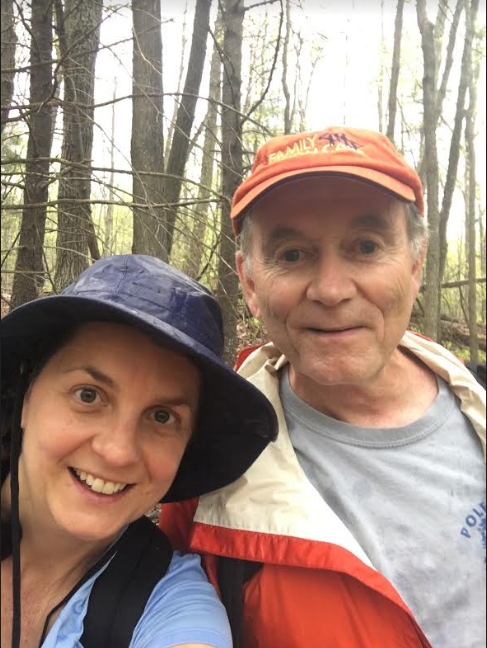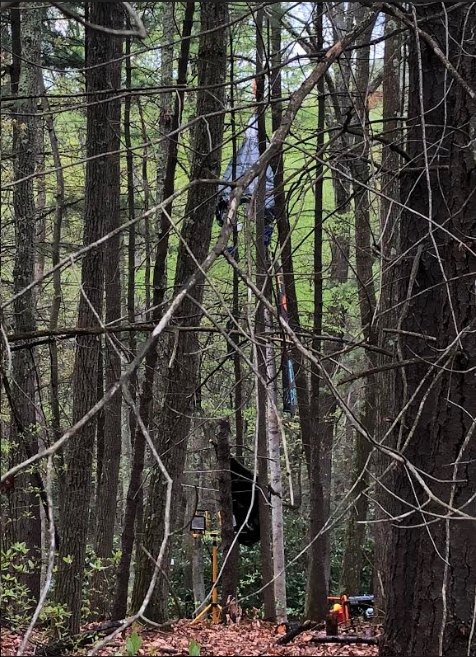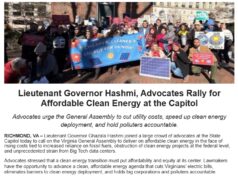 by Paige Perriello
by Paige Perriello
Wow! Why would anyone – particularly state authorities – go out of their way to block a doctor from talking to someone who is clearly at risk of dehydration, hunger and physical harm?
As most of you know, I am a pediatrician from Central Virginia who spent last weekend trying to provide medical care to Red Terry, the matriarch deep in Virginia’s Blue Ridge who spent four weeks in their family treehouse trying to block extractive monopolies from destroying the heritage she had hoped to pass along to her daughter Minor. Locals across the political spectrum had rallied to her cause of opposing this threat to local groundwater and heritage. Dr. Greg Gelburd and I felt like our Hippocratic Oath called us to #StandwithRed and #StandwithMinor, by at least providing humanitarian medical care and supplies. Much to our surprise, authorities blocked us from even passing up basic lotions and vitamins.
Today, our medical team returned to visit another tree sitter deeper in the woods who chooses to go by “Nutty.” We hiked deep into the breathtaking Appalachian forests to reach a woman suspended by wires on a “monpod,” deep in Giles county. Our mission, once again, was nothing more than a medical check-up for a brave woman trying to protect the safety of land and water for all Virginians. We understood it was unlikely we would be allowed to examine her, but we assumed the state would at least allow us to ask her a few urgent medical questions.
When we arrived at the support camp, the noise of the Forest Service generator was immediately obvious, drowning out the sounds of the birds and drizzle we had heard on our hike up. Thankfully, the anti-pipeline protestors had a megaphone, which allowed us to introduce ourselves to Nutty. As we started to ask her some basic medical questions, the National Forest Service below (watching us with binoculars) moved slightly up the hill. We were hopeful they would come up to line so we could talk to them and ask permission to examine Nutty. We quickly realized, however, that they were coming to move the generator closer to the monopod to make it almost impossible for her to hear us.
Based on last weekend, I was prepared to provide no more than a virtual check-up, but as a doctor I was not prepared at all for forest service officials to pro-actively block efforts for us to even inquire about the critical conditions of a woman that all of us could clearly see just a few dozen feet away.
After this, we asked an EMT who was there if he could tell the authorities to come up to talk to us so we could ask if we could examine her and talk to her without the generators to assess her condition. After a period of time, he returned to tell us that the Forest Service would not come up to talk to us. I get that they have a job to do and they are “following orders,” but was there an order that said, “Hey, if two doctors show up, be sure to move the generator closer so they can’t have even an ounce of communication with an ailing human being?” Honestly what is the legal justification for shining spotlights on the support team and up at Nutty at night to disturb sleep? They have built a campfire close enough to the monopod that the smoke surrounds her location all night. They use the generator noise to try to make it impossible for her support team to communicate to her. How high up do these orders come from to harass this peaceful protester?
 A final thought – on the way up the Appalachian Trail, it was impossible not to be aghast thinking about what the construction of this pipeline (that experts have deemed unnecessary) would do to this mountain and the surrounding counties. Do yourself a favor, and go for a visit….see firsthand the beauty of the mountain and wonder at the steep slope of the land and ask yourself how in the world a pipeline can be safely built through this mountain.
A final thought – on the way up the Appalachian Trail, it was impossible not to be aghast thinking about what the construction of this pipeline (that experts have deemed unnecessary) would do to this mountain and the surrounding counties. Do yourself a favor, and go for a visit….see firsthand the beauty of the mountain and wonder at the steep slope of the land and ask yourself how in the world a pipeline can be safely built through this mountain.
If you can’t go visit, be sure everyone you know tunes in to this issue – the future of our natural resources and safe water depend on it. If you want to contribute directly to support the anti-pipeline protesters on the ground and the legal fees of those who are trying to protect these gorgeous but too often left behind communities, click here,
here and here.


![[UPDATED 1/29/26] Audio: Sen. Tim Kaine Talks to Blue Virginia About His “Five-Point Plan” to Fight Trump’s Orban-Like Assault on US Democracy; Civil Disobedience a la MLK Jr.; Trump’s Bogus “Energy Emergency”; the Crucial Importance of the 2025 VA Elections; etc.](https://bluevirginia.us/wp-content/uploads/2025/02/kaineinterview2-238x178.jpg)
![VA DEQ: “pollution from data centers currently makes up a very small but growing percentage of the [NoVA] region’s most harmful air emissions, including CO, NOx and PM2.5”](https://bluevirginia.us/wp-content/uploads/2026/01/noxdatacenters-238x178.jpg)






![[UPDATED 1/29/26] Audio: Sen. Tim Kaine Talks to Blue Virginia About His “Five-Point Plan” to Fight Trump’s Orban-Like Assault on US Democracy; Civil Disobedience a la MLK Jr.; Trump’s Bogus “Energy Emergency”; the Crucial Importance of the 2025 VA Elections; etc.](https://bluevirginia.us/wp-content/uploads/2025/02/kaineinterview2-100x75.jpg)
